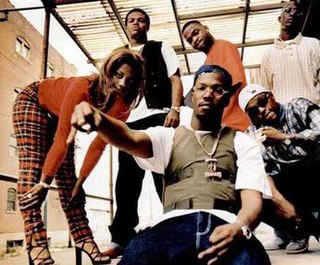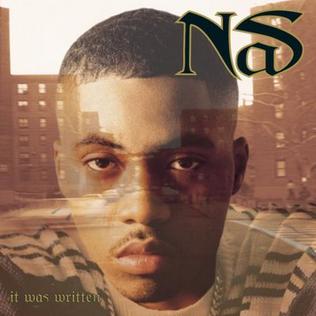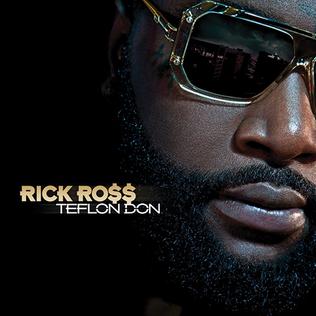Gangsta rap or gangster rap, initially called reality rap, is a subgenre of rap music that conveys the culture and values typical of urban gangs, reality of the world and street hustlers. Emerging in the late 1980s, gangsta rap's pioneers include Schoolly D of Philadelphia and Ice-T of Los Angeles, later expanding in California with artists such as N.W.A and Tupac Shakur. In 1992, via record producer and rapper Dr. Dre, rapper Snoop Dogg, and their G-funk sound, gangster rap broadened to mainstream popularity.
The new school of hip hop was a movement in hip hop music, beginning in 1983–84 with the early records of Run–D.M.C., Whodini, and LL Cool J. Predominantly from Queens and Brooklyn, it was characterized by Drum Machine-led minimalism, often tinged with elements of Rock; rapped taunts, boasts, and socio-political commentary; and aggressive, self-assertive delivery. In song and image, its artists projected a tough, cool, street B-boy attitude. These elements contrasted sharply with Funk and Disco, Novelty hits, live bands, synthesizers, and party rhymes of artists prevalent in the early 1980s. Compared to their older hip hop counterparts, new school artists crafted more cohesive LPs and shorter songs more amenable to airplay. By 1986, their releases began to establish hip hop in the mainstream.

Straight Outta Compton is the debut studio album by American gangsta rap group N.W.A, which, led by Eazy-E, formed in Los Angeles County's City of Compton in early 1987. Released by his label, Ruthless Records, on August 8, 1988, the album was produced by N.W.A members Dr. Dre, DJ Yella, and Arabian Prince, with lyrics written by N.W.A members Ice Cube and MC Ren along with Ruthless rapper and unofficial member The D.O.C. Not merely depicting Compton's street violence, the lyrics repeatedly threaten to lead it by attacking peers and even police. The track "Fuck tha Police" drew an FBI agent's warning letter, which aided N.W.A's notoriety, with N.W.A calling itself "the world's most dangerous group."

Doggystyle is the debut studio album by American rapper Snoop Doggy Dogg. It was released on November 23, 1993, by Death Row and Interscope Records. The album was recorded and produced following Snoop Doggy Dogg's appearances on Dr. Dre's debut solo album The Chronic (1992), to which Snoop contributed significantly. The West Coast style in hip-hop that he developed from Dre's first album continued on Doggystyle. Critics have praised Snoop Dogg for the lyrical "realism" that he delivers on the album and for his distinctive vocal flow.

Three 6 Mafia is an American hip hop group from Memphis, Tennessee, formed in 1991. Emerging as a horror-themed underground hip hop group, they went on to enjoy mainstream success. The group's 1995 debut album Mystic Stylez became an influential cult classic. They have released music on independent labels such as Prophet Entertainment and their own Hypnotize Minds label, as well as Relativity, Loud, and Columbia Records.
UK rap, also known as British hip hop or UK hip hop, is a music genre and culture that covers a variety of styles of hip hop music made in the United Kingdom. It is generally classified as one of a number of styles of R&B/hip-hop. British hip hop can also be referred to as Brit-hop, a term coined and popularised mainly by British Vogue magazine and the BBC. British hip hop was originally influenced by the dub/toasting introduced to the United Kingdom by Jamaican migrants in the 1950s–70s, who eventually developed uniquely influenced rapping in order to match the rhythm of the ever-increasing pace and aggression of Jamaican-influenced dub in the UK. Toasting and soundsystem cultures were also influential in genres outside of hip hop that still included rapping – such as grime, jungle, and UK garage.

N.W.A. and the Posse is a compilation album, re-releasing N.W.A and associated groups' underground rap songs from the Los Angeles area's rap scene on November 6, 1987. It is regarded as American rap group N.W.A's first but neglected album; N.W.A's authorized debut studio album, rather, is Straight Outta Compton, released in August 1988. Whereas the Straight album was certified platinum, one million copies sold in July 1989, the Posse album was certified gold, half as many copies sold, in April 1994.

"Gangsta's Paradise" is a single by American rapper Coolio, released on August 1, 1995 by Tommy Boy, Warner Bros. and MCA. Interpolating Stevie Wonder's song "Pastime Paradise" (1976), "Gangsta's Paradise" features vocals from American singer L.V. who served as a co-composer and co-lyricist with Coolio and Doug Rasheed, with Wonder also being credited for the composition and lyrics. Certified Platinum in October, the song was included on Coolio's second album, Gangsta's Paradise, in November 1995. Its music video was directed by Antoine Fuqua and featured Michelle Pfeiffer. The song is taken from Pfeiffer's movie Dangerous Minds, and the music video is also themed around the movie.

Eazy-Duz-It is the debut studio album by American rapper Eazy-E. It was released on November 22, 1988, by Ruthless Records and Priority Records. The album charted on two different charts and went 2× Platinum in the United States despite very little promotion by radio and television. Three singles were released from the album, each charting in the US. The remastered version contains tracks from the extended play (EP), 5150: Home 4 tha Sick (1992). The 25th anniversary (2013) contains two bonus tracks which are 12" remixes of "We Want Eazy" and "Still Talkin.'"
Austrian hip hop is not a genre of hip hop music, but covers all hip hop music from Austria. The majority of Austrian hip hop acts do Underground hip hop, as the big radio stations in Austria have no airtime for native hip hop. The only radio station that does so is FM4, which focuses on alternative music.
Rowdy Lewayne Williams, better known as Ganxsta NIP, is an American rapper from South Park, Houston, Texas and a member of the South Park Coalition, which he co-founded in 1987 with Houston rapper K-Rino. In 1992 he released his debut album South Park Psycho. This record also helped put the South Park Coalition name on the map due to world wide distribution from Rap-a-Lot. He also wrote the Geto Boys hit "Chuckie". NIP stands for "Nation of Islam Is Powerful"; he is also a part of the Nation of Islam. Williams is also looked at as one of the creators of the horrorcore rap genre.

"Miss Independent" is a song by American singer-songwriter Ne-Yo. It is the second single from his album. Year of the Gentleman (2008), and was produced by Stargate. It samples the song "Forget About Me" by Keesha. The song was written by Ne-Yo and co-written by Stargate. It was released as a music download on August 26, 2008, and physical release on September 2, 2008.
Hip hop or hip-hop, formerly known as disco rap, is a genre of popular music that originated in the early 1970s from the African American community. Hip-hop music originated as an anti-drug and anti-violence genre consisting of stylized rhythmic music that often accompanies rapping, a rhythmic delivery of poetic speech. In the early 1990s, a professor of African American studies at Temple University said, "Hip-hop is something that blacks can unequivocally claim as their own." By the 21st century, the field of rappers had diversified by both race and gender. The music developed as part of the broader hip-hop culture, a subculture defined by four key stylistic elements: MCing/rapping, DJing/scratching with turntables, breakdancing, and graffiti art. While often used to refer solely to rapping and rap music, "hip hop" more properly denotes the practice of the entire subculture. The term hip hop music is sometimes used synonymously with the term rap music, though rapping is not a required component of hip hop music; the genre may also incorporate other elements of the culture, including DJing, turntablism, scratching, beatboxing, and instrumental tracks.
Alternative hip hop is a subgenre of hip hop music that encompasses a wide range of styles that are not typically identified as mainstream. AllMusic defines it as comprising "hip hop groups that refuse to conform to any of the traditional stereotypes of rap, such as gangsta, bass, hardcore, and party rap. Instead, they blur genres drawing equally from funk and pop/rock, as well as jazz, soul, reggae, and even folk."
Joseph Johnson, known by his stage name N.O. Joe, is an American musician, hip hop record producer and songwriter. N.O. Joe was a pioneer of the Southern Hip Hop sound during the 1990s. He operates a production company named Gumbo Funk, which is also a name given to his melange of musical styles
Charles Williams, better known by his stage name Chalie Boy, is an American hip hop recording artist, who made his major-label debut in 2009 with the breakout hit single "I Look Good." In 2010, Chalie Boy made headlines with his 100+ lb. weight loss as he debuted the video "Deja Blu."

Pierrot, born Tamás Zoltán Marosi is a Hungarian pop singer, computer and tabletop game designer, musician and producer, best known internationally for his video game series AGON and Yoomurjak's Ring. He is also well known in Hungary as a musician, singer-songwriter and producer of several music albums. His own music style is primarily acoustic “adult pop”, while as a producer, he has a colorful portfolio of various styles ranging from world music to alternative rock to reggae and hip-hop. He has also been involved in edutainment and tourism projects such as an interactive sight-seeing game network Kaland&Játék (Adventure&Game). He is author of a book on Asian gastronomy, a series of novels and a story-book for children. The name Pierrot had originally been his nickname. He has been using this alias both as musician and game developer since 1986.

By Any Means is the eleventh commercial mixtape by American rapper Kevin Gates. It was released on March 17, 2014, by his Breadwinners Association label, distributed by Atlantic Records. The mixtape debuted at number 17 on the Billboard 200, selling 17,000 copies in the United States. On DatPiff, this mixtape has been downloaded over 1,038,543 times, as of January 22, 2019.

It Was Written is the second studio album by American rapper Nas, released on July 2, 1996, by Columbia Records. After the modest commercial success of his debut album Illmatic (1994), Nas pursued a more polished, mainstream sound for It Was Written. Produced largely by Trackmasters, it departed from the debut's raw, underground aesthetic and embraced mafioso and gangsta themes.

Teflon Don is the fourth studio album by American rapper Rick Ross, released on July 20, 2010, on Maybach Music Group, Slip-n-Slide Records and Def Jam Recordings. Production for the album took place during 2009 to 2010 and was handled by several record producers, including Clark Kent, No I.D., The Olympicks, J.U.S.T.I.C.E. League, Lex Luger, Danja, The Inkredibles, The Remedy, and Kanye West.










